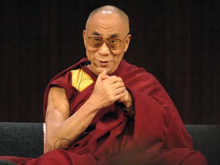Education Brings Equality, and More Wisdom from the Dalai Lama
-
-
slice.mit.edu
Filed Under
Recommended

Commemorating the three-year anniversary of the Dalai Lama Center for Ethics and Transformative Values at MIT, the Dalai Lama returned to Cambridge and Boston to discuss religion's role in compassion and spirituality, and how religion intersects with science.
On Oct. 14, His Holiness delivered a talk, "Beyond Religion: Ethics, Values, & Wellbeing." Moderated by longtime Boston news anchor Rev. Liz Walker, the talk featured responses from theologians Fr. Thomas Keating, a Trappist monk from Colorado, and Br. David Steindl-Rast, a Benedictine monk from New York City.
"'Beyond Religion' doesn’t mean that something is better than religion," he says. "It means relying not just on faith, but on all religious traditions, with an emphasis on love, forgiveness, and compassion."
Prior to the discussion, musician James Taylor, accompanied by Boston Symphony Orchestra cellist Owen Young, performed an eight-song set that included "Sweet Baby James," "America the Beautiful," and "You’ve Got a Friend."
The two hour-long talk, held in front of roughly 2,500 people, touched on religion's coexisting relationship with science.
"It's easy to say, 'Jesus Chris, Buddha, or Allah said to do this,'" His Holiness says. "Scientific findings can help educate us all towards a better life."
The Dalai Lama also stressed continued learning as a key component towards a fuller life, and the important role that ethics must play in education.
"Education brings more equality," he says. "From kindergarten to university, we have to educate some kind of teaching of ethics. We're not talking about heaven, hell, nirvana, or the next life—we're talking only about building a happier, healthier world."
Keating and Steindl-Rast agreed that religion and science are interconnected, despite rhetoric that insists that they are mutually exclusive.
"Ethics is not dependent on religion," Keating says. "The mystery of this world, and the realization of what is beyond, occurs both in different religions, and in science. Science raises questions in the reflective mind, and there are different ways of looking at this vision."
Above all, His Holiness stressed compassion—for children, neighbors, classmates, and strangers.
"Compassion and love are not religious," he says. "If you have faith—wonderful! To me, secular does not mean non-religious. It means respect all religions, including non-believers."
On Monday, Oct. 15, the Center will host the two-part "Global Systems 2.0," which will feature Professor John Sterman PhD '82 and Nobel Peace Prize winner James Orbinski.
Visit The Center’s website for more information on the Dalai Lama's visit to MIT.







